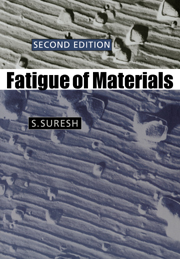Book contents
1 - Introduction and overview
Published online by Cambridge University Press: 05 June 2012
Summary
The word fatigue originated from the Latin expression fatīgāre which means ‘to tire’. Although commonly associated with physical and mental weariness in people, the word fatigue has also become a widely accepted terminology in engineering vocabulary for the damage and failure of materials under cyclic loads. A descriptive definition of fatigue is found in the report entitled General Principles for Fatigue Testing of Metals which was published in 1964 by the International Organization for Standardization in Geneva. In this report, fatigue is defined as a term which ‘applies to changes in properties which can occur in a metallic material due to the repeated application of stresses or strains, although usually this term applies specially to those changes which lead to cracking or failure’. This description is also generally valid for the fatigue of nonmetallic materials.
Fatigue failures occur in many different forms. Mere fluctuations in externally applied stresses or strains result in mechanical fatigue. Cyclic loads acting in association with high temperatures cause creep-fatigue; when the temperature of the cyclically loaded component also fluctuates, thermomechanical fatigue (i.e. a combination of thermal and mechanical fatigue) is induced. Recurring loads imposed in the presence of a chemically aggressive or embrittling environment give rise to corrosion fatigue. The repeated application of loads in conjunction with sliding and rolling contact between materials produces sliding contact fatigue and rolling contact fatigue, respectively, while fretting fatigue occurs as a result of pulsating stresses along with oscillatory relative motion and frictional sliding between surfaces.
- Type
- Chapter
- Information
- Fatigue of Materials , pp. 1 - 36Publisher: Cambridge University PressPrint publication year: 1998
- 3
- Cited by



